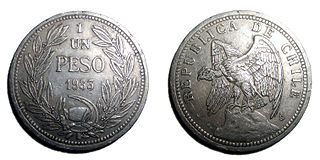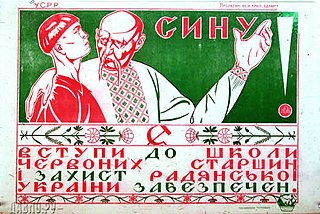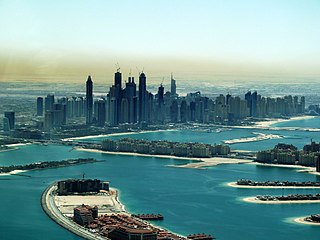Related Research Articles

The economy of Laos is a lower-middle income developing economy. Being one of the socialist states, the Lao economic model resembles the Chinese socialist market and/or Vietnamese socialist-oriented market economies by combining high degrees of state ownership with openness to foreign direct investment and private ownership in a predominantly market-based framework.

A foreign direct investment (FDI) refers to purchase of an asset in another country, such that it gives direct control to the purchaser over the asset. In other words, it is an investment in the form of a controlling ownership in a business, in real estate or in productive assets such as factories in one country by an entity based in another country. It is thus distinguished from a foreign portfolio investment or foreign indirect investment by a notion of direct control.
The socialist market economy (SME) is the economic system and model of economic development employed in the People's Republic of China. The system is a market economy with the predominance of public ownership and state-owned enterprises. The term "socialist market economy" was introduced by Jiang Zemin during the 14th National Congress of the Chinese Communist Party (CCP) in 1992 to describe the goal of China's economic reforms.

The nationalization of the Chilean copper industry, commonly described as the Chileanization of copper was the process by which the Chilean government acquired control of the major foreign-owned section of the Chilean copper mining industry. It involved the three huge mines known as 'La Gran Mineria' and three smaller operations. The Chilean-owned smaller copper mines were not affected. The process started under the government of President Carlos Ibáñez del Campo, and culminated during the government of President Salvador Allende, who completed the nationalization. This "act of sovereignty" was the espoused basis for a later international economic boycott, which further isolated Chile from the world economy, worsening the state of political polarization that led to the 1973 Chilean coup d'état.

The Tehran Stock Exchange (TSE) is Iran's largest stock exchange, which first opened in 1967. The TSE is based in Tehran. As of May 2023, 666 companies with a combined market capitalization of US$1.45 trillion were listed on TSE. TSE, which is a founding member of the Federation of Euro-Asian Stock Exchanges, has been one of the world's best performing stock exchanges in the years 2002 through 2013. TSE is an emerging or "frontier" market.

The Central Bank of Nigeria (CBN) is the central bank and apex monetary authority of Nigeria established by the CBN Act of 1958 and commenced operations on 1 July 1959. The major regulatory objectives of the bank as stated in the CBN Act are to: maintain the external reserves of the country; promote monetary stability and a sound financial environment, and act as a banker of last resort and financial adviser to the federal government. The central bank's role as lender of last resort and adviser to the federal government has sometimes pushed it into murky political controversies. After the end of colonial rule, the desire of the government to become proactive in the development of the economy became visible, especially after the end of the Nigerian civil war, the bank followed the government's desire and took a determined effort to supplement any show shortfalls, credit allocations to the real sector. The bank became involved in lending directly to consumers, contravening its original intention to work through commercial banks in activities involving consumer lending.
The Daily Times was a Nigerian newspaper with headquarters in Lagos. At its peak, in the 1970s, it was one of the most successful locally-owned businesses in Africa.
According to the Fourth Five-Year Economic Development Plan (2005–2010), the Privatization Organization of Iran affiliated with the Ministry of Economic Affairs and Finance is in charge of setting prices and ceding shares to the general public and on the Tehran Stock Exchange. The privatization effort is primarily backed by reformist members of the Iranian government and society who hope that privatization can bring about economic and social change.
Henry Oloyede Fajemirokun, CON was a trade unionist who later became a prominent Nigerian industrialist and businessman and one of the country's dynamic indigenous entrepreneurs who had established and built one of the foremost indigenous private sector business concerns in his time. He was a strong believer in, and promoted West Africa's economic integration alongside Adebayo Adedeji which subsequently led to the formation of the Economic Community of West African States (ECOWAS).

Evans Brothers Limited is a Nigerian educational publisher that publishes textbook titles for all levels of education.

Foreign direct investment in Iran (FDI) has been hindered by unfavorable or complex operating requirements and by international sanctions, although in the early 2000s the Iranian government liberalized investment regulations. Iran ranks 62nd in the World Economic Forum's 2011 analysis of the global competitiveness of 142 countries. In 2010, Iran ranked sixth globally in attracting foreign investments.
Between 1950 and 1960, the imperial government of Ethiopia enacted legislation and implemented a new policy to encourage foreign investment in the Ethiopian economy. This new policy provided investor benefits in the form of tax exemptions, remittances of foreign exchange, import and export duty relief, tax exemptions on dividends, and the provision of financing through the Ethiopian Investment Corporation and the Development Bank of Ethiopia. In addition, the government guaranteed protection to industrial enterprises by instituting high tariffs and by banning the importation of commodities that might adversely affect production of domestic goods. Protected items included sugar, textiles, furniture, and metal. The government also participated through direct investment in enterprises that had high capital costs, such as oil refineries and the paper and pulp, glass and bottle, tire, and cement industries. In 1963, with the Second Five-Year Plan under way, the government enacted Proclamation No. 51. The proclamation's objective was to consolidate other investment policies enacted up to that period, to extend benefits to Ethiopian investors, and to create an Investment Committee that would oversee investment programs. In 1966 the Ethiopian government enacted Proclamation No. 242, which elevated the Investment Committee's status as an advisory council to that of an authorized body empowered to make independent investment decisions. Thus, by the early 1970s, Ethiopia's industrialization policy included a range of fiscal incentives, direct government investment, and equity participation in private enterprises.
On March 9, 2008, Zimbabwe's president, Robert Mugabe, signed the Indigenisation and Economic Empowerment Bill into law. The bill was passed through parliament in September 2007 by President Mugabe's party, the Zimbabwe African National Union-Patriotic Front (ZANU-PF), in spite of resistance by the opposition party, Movement for Democratic Change (MDC).

Corporate law in Vietnam was originally based on the French commercial law system. However, since Vietnam's independence in 1945, it has largely been influenced by the ruling Communist Party. Currently, the main sources of corporate law are the Law on Enterprises, the Law on Securities and the Law on Investment.

Indigenization is the act of making something more indigenous; transformation of some service, idea, etc. to suit a local culture, especially through the use of more indigenous people in public administration, employment and other fields.

United Arab Emirates corporate law regulates the governance, finance and power of corporations in the United Arab Emirates (UAE) through UAE law. Every emirate has its own basic corporate code.

Golden Age or Golden era are terms used in Nigerian film history to designate the motion picture industry of Nigeria from the late 1950s to the late 1980s. It captures the mode of visual and sound production, as well as the method of distribution employed during this period. This period began with the formal recognition of the Nigerian Film Unit as a sector in 1954, with the first film entirely copyrighted to this unit being Fincho (1957) by Sam Zebba.
Unilever Nigeria Plc is a publicly listed company with trading and manufacturing interest in the consumer goods market. In 2014, it was listed among the top 20 most valuable companies quoted on the Nigerian Stock Exchange. Unilever Nigeria PLC is a subsidiary of Unilever Overseas Holding B.V.
Seven-Up Bottling Company Ltd is a soft drinks manufacturer headquartered in Lagos, Nigeria. Its shares were previously quoted on the Nigerian Stock Exchange but after a buyout of outstanding public shares by the investment arm of the founder's family, it became privately owned. Seven-Up Bottling Company Ltd is one of the largest manufacturing companies in Nigeria, producing and distributing some of the nation's most-loved beverages in the country like; Pepsi, 7Up, Mirinda, Teem, Mountain Dew, H2oH!, Lipton Ice Tea, Supa Komando Energy Drink and Aquafina premium drinking water.
Oluwole Alani Adeosun was a Nigerian banker who was chief executive officer of NAL Merchant Bank from 1979 to 1987 and then First Bank of Nigeria from 1987 to 1990. He was appointed Secretary of Transportation in the Transitional National Government of Ernest Shonekan in 1993.
References
- ↑ "Corruption a Delicate Subject." Nigeria: Financial Times Survey. Financial Times, 30 Sept. 1980, p. XLII. The Financial Times Historical
- ↑ Vincent, Ola (July 1979). "Using local resources to achieve increase in productivity". Nigerian business digest. (Universal Publications) Lagos.
- ↑ Valentine., Nde Fru (2011). The international law on foreign investments and host economies in Sub-Saharan Africa : Cameroon, Nigeria, and Kenya. Berlin: Lit. p. 145. ISBN 9783643109743. OCLC 761742714.
- 1 2 The Political economy of Nigeria . New York, N.Y.: Praeger. 1983. ISBN 978-0030614767. OCLC 8929158.
- 1 2 Akinsanya, Adeoye (1994). "The Power Structure in Nigeria and the Indigenization of the Economy". Pakistan Horizon. 47 (2): 63–79. JSTOR 41393473.
- 1 2 Uche, Chibuike U. (2012). "British Government, British Businesses, and the Indigenization Exercise in Post-Independence Nigeria". Business History Review. Vol. 86, no. 4. pp. 745–771. doi:10.1017/S000768051200181X. ISSN 0007-6805.
- 1 2 3 Remi, Anifowose (1980). "Indigenisation policies in Africa: a comparative view". Genève-Afrique: Acta Africana. 18 (1): 9–17.
- 1 2 A Correspondent. "Great Potential." Nigeria: Financial Times Survey. Financial Times, 29 Aug. 1978, p. 35. The Financial Times Historical Archive